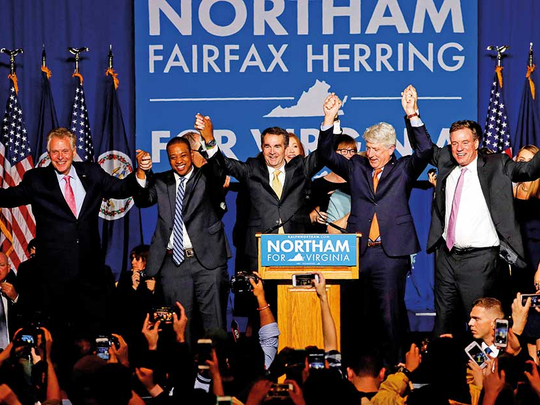
RICHMOND, Va.: The American suburbs appear to be in revolt against President Donald Trump after a muscular coalition of college-educated voters and racial and ethnic minorities on Tuesday dealt the Republican Party a thumping rejection and propelled a diverse class of Democrats into office.
From the tax-obsessed suburbs of New York City to high-tech neighbourhoods outside Seattle to the sprawling, polyglot developments of Fairfax and Prince William County, Virginia, voters shunned Republicans up and down the ballot in off-year elections. Leaders in both parties said the elections were an unmistakable alarm bell for Republicans ahead of the 2018 campaign, when the party’s grip on the House of Representatives may hinge on the socially moderate, multiethnic communities near major cities.
“Voters are taking their anger out at the president, and the only way they can do that is by going after Republicans on the ballot,” said Rep. Charlie Dent, R-Pa.
The Democrats’ gains signalled deep alienation from the Republican Party among the sort of upscale moderates who were once central to their coalition.
Democrats not only swept Virginia’s statewide races but neared a majority in the House of Delegates, a legislative chamber that was gerrymandered to make the Republican majority virtually unassailable. They seized county executive offices in Westchester and Nassau counties, New York, and carried bellwether mayoral elections in St. Petersburg, Florida, and Manchester, New Hampshire — all races that appeared to favour Republicans only months ago.
In Washington state, Democrats won a special election to take control of the state Senate, establishing total Democratic dominance of government on the West Coast. Democrats took council seats in vote-rich Delaware County, in the Philadelphia suburbs, a perennial congressional battleground.
Even in the Deep South, Georgia Democrats captured two state House seats where they previously had not even fielded candidates while snatching a state Senate seat in Buckhead, an upscale area of Atlanta.
Chris Vance, a former chairman of the Washington state Republican Party, placed the blame squarely on Trump: “Among college-educated suburbanites, he is a pariah.”
Democrats still face formidable obstacles in the 2018 election, including some not at work in this week’s elections. If a suburban insurrection might help Democrats take the House, the Senate seats at stake next year are overwhelmingly in conservative, rural states, where feelings about Trump range from ambivalent to positive. So far, only two Republican Senate seats are clearly in play: the one in Arizona being vacated by Jeff Flake and Dean Heller’s in Nevada.
In House races, Democratic candidates are likely to face Republican attacks tying them to Rep. Nancy Pelosi of California, the unpopular Democratic minority leader, and to liberal policies, like single-payer health care, that are causing divisions in the Democratic ranks.
But for Republicans, the bad news was not likely to end with Tuesday’s results.
Congressional Republicans on Wednesday were bracing for a new wave of retirements just one day after another pair of veteran House members, Rep. Frank A. LoBiondo of New Jersey and Rep. Ted Poe of Texas, declared they would not seek re-election. Already, 29 House Republicans have said they will not run again, while just seven Democrats have announced plans to retire.
Dent, channelling the exasperation of his colleagues, suggested an exodus might be imminent. “Do they really want to go through another year of this?” said Dent, a leader of his caucus’ moderate wing, who has announced he will not run again.
In the White House, electoral defeat gave way to a shifting series of explanations: Trump’s first reaction was to savage Ed Gillespie, the defeated Republican candidate for governor in Virginia, on Twitter. By Wednesday morning, two presidential advisers acknowledged antipathy toward Trump would probably drive Democratic turnout in 2018.
But by Wednesday afternoon, the story changed again: At a White House briefing, aides dismissed the importance of New Jersey and Virginia in either 2018 or 2020. One White House official blamed congressional Republicans, asserting that swing voters on Tuesday embraced Democrats because they were frustrated that lawmakers had not moved on the president’s agenda.
But some of the most competitive House races of the 2018 midterms will take place in the two states. In New Jersey, Republicans will struggle to retain LoBiondo’s seat and must protect such imperilled incumbents as Leonard Lance, Tom MacArthur and Rodney Frelinghuysen. In Virginia, the district of Rep. Barbara Comstock, a Republican, went 56 per cent to 43 per cent for Lt. Gov. Ralph S. Northam, the Democrats’ triumphant candidate for governor. Northam also captured 51 per cent of the votes in the district of Rep. Scott Taylor, a freshman Republican from Virginia Beach.
— New York Times News Service












